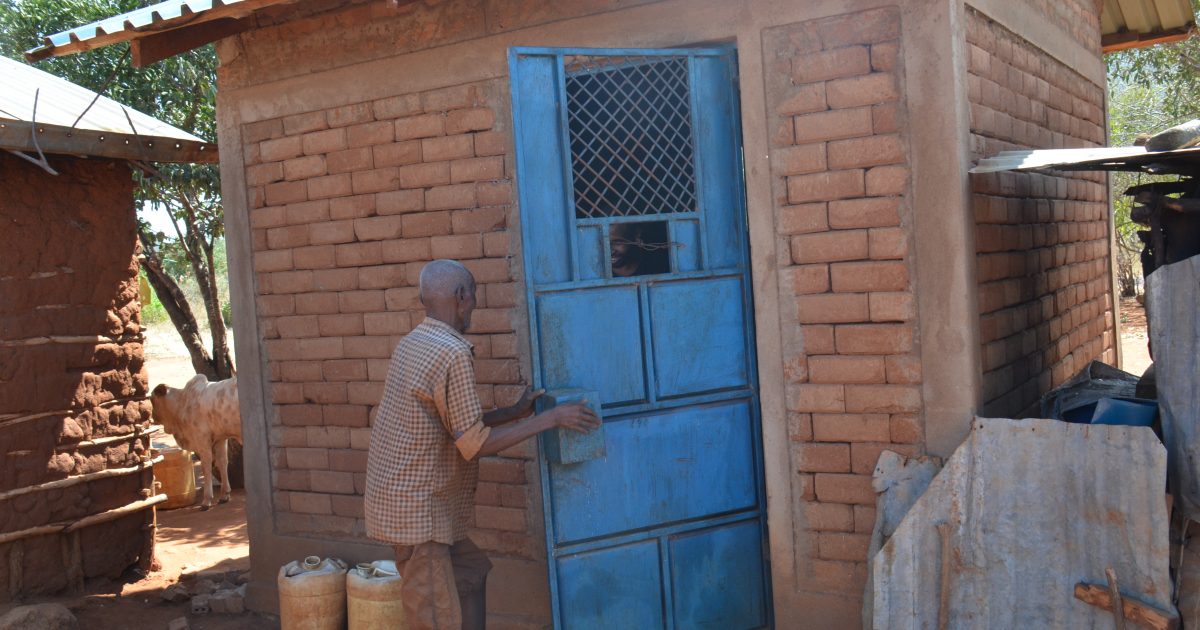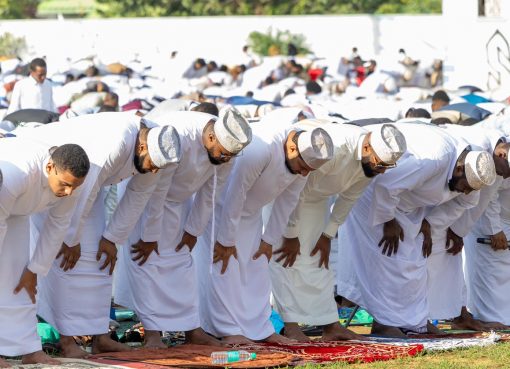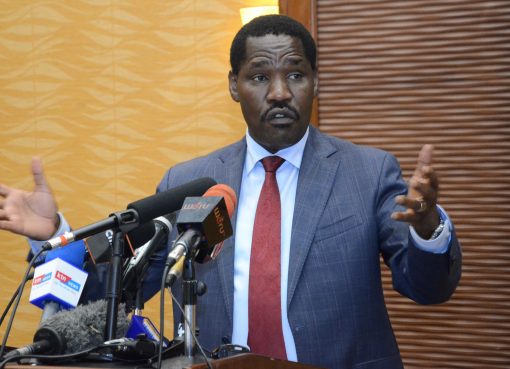Mzee Evanson Malandi, 77, gently knocks on the grilled door of the small one-roomed brick house in Kirumbi village in Sagalla, Voi. A face peeks out through the grill. It is his son. The young man has been living in this small house since 2020 after Man-Go development built it for him. The brick walls are sturdy; the steel door, grilled windows, the ceiling and iron sheets complete the feel of a modern house.
After a brief chat with his son, the old man limps back to a mattress under a tree where he is resting from the grueling heat of the day. “They built it for my son because he needed it most,” he says with a satisfied twinkle in his eye.
Mzee Malandi’s son is a mentally feeble. The family is poor and cannot afford to put up a decent shelter for him. For many years, they chained him to a post in a dilapidated hovel to prevent him from straying away and getting lost. That was until Man-Go Development came to his rescue and put up a low-cost house that he lives in currently.
Ms Rachel Mwakazi, Programme Director for Man-Go Development, says the organisation hopes to provide decent housing for the neediest to restore their dignity and give them a place to call a home. Man-Go is a Community-Based Organisation (CBO) based in Norway that focuses on empowerment of rural communities in marginalised areas in Kenya. Most of CBO’s activities are in Taita-Taveta County.
Ms Mwakazi cites mentally frail young man at Kirumbi as a representative of a large portion of destitute people existing in the fringes of marginalised rural communities. Such people remain neglected, forgotten and ignored by the rest of the community owing to high poverty levels associated with rural communities.
“Man-Go Development often steps in to assist in extreme cases but there is only so much we can do,” says Mwakazi. She says Man-Go’s intention is to build decent shelters for the rural poorest who live in deplorable conditions.
The organisation’s approach to the rural-housing model is viewed as a pointer to the transformative impacts diaspora remittances can have on rural communities through strategic investments to empower the community.
Already, the organisation has built five houses and handed them over to their owners in a period of four years across several villages in Voi including Mrangi, Gimba and Kirutai. The beneficiaries include the mentally feeble and old widows with a large burden of children to support.
To Mwakazi, a veteran community-development expert, housing remains one of the major challenges in marginalised communities. However, despite the severity of the problem, many stakeholders mainly focus on the plight of the urban poor especially those in slum areas.
“Housing challenges in towns get prioritised for action. Such problems in rural communities and remote areas are relegated to the backburner and rarely get much attention. Thousands of rural poor are just as needy as those in towns,” she says.
Mwakazi says Kenyans in diaspora can use their remittances to address some of those chronic problems found in rural areas including provision of decent housing to the poor. She adds that Man-Go’s housing initiative complements the government’s housing goal under the Big 4 Agenda.
Under the housing pillar, the government aims at building 500,000 low-cost affordable houses across the 47 counties. This will also create over 300,000 jobs in the construction sector. The private sector is being looped in to supplement the government’s efforts. This is either through direct funding or by engaging in construction of houses.
For Man-Go, it is through directly putting up houses for the beneficiaries. Mwakazi, who lives in Norway, monitors the project remotely. Her local networks provide up-to-date data on any project the CBO is undertaking. The networks include shops supplying materials and youth to document the project using photos, videos and live Whatsapp and Zoom calls.
Such efforts, she says, eliminate corruption and embezzlement of funds associated with projects being managed by Kenyans abroad. “I follow the projects from start to completion. I demand for transparency from everyone involved,” she says.
This approach, apart from killing graft, has seen community benefit directly. Man-Go’s advocates for a rural-based approach with total utilisation of locally-sourced materials and labour. This allows project money to circulate and stimulate the grassroots village economy.
“Man-Go aims to spread the benefits associated with projects to the community,” she notes.
The materials like sand, ballast and stones are sourced from local quarries. Local shops and hardware stores supply building materials like cement and roofs. Labour comes from the community.
“We employed competent youths trained in local vocational training centres as masons. The semi-skilled youths make bricks as other people bring water and sand. The community makes money while the targeted beneficiary owns a house. It’s a win-win situation,” she said.
This approach offers a novel way into how Kenyans abroad can inject money to spur rural economic development and augment government’s initiative to empower the poor.
To date, Man-Go is estimated to have spent over Sh 1.5 million to build the five houses. Over 80 per cent of the money has gone directly to the community.
Data from the Central Bank of Kenya (CBK) shows diaspora remittances in 2020 rose to Sh 340 billion up from Sh 308 billion in 2019. Mwakazi terms this as an indicator of the muscle of the diaspora population to support development of rural communities if well incentivised.
“Kenyans abroad can do projects in their homes and ensure money flows within the community,” she says noting that such a move will lead to poverty eradication while promoting local development.
Mwakazi says the diaspora should be incentivised to invest more in rural areas instead of towns and other developed areas. Putting up capital-intensive projects in marginalised areas will attract other benefits like good roads, water and power.
“It’s wise for the diaspora to invest in rural areas as a way of decentralising wealth. Though the investment might not have immediate returns, it will gradually open up such areas for business,” she said.
by Wagema Mwangi





